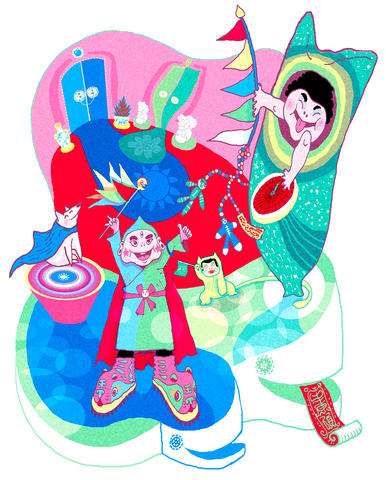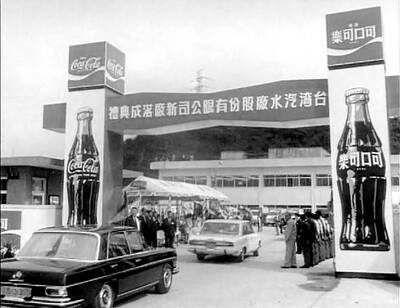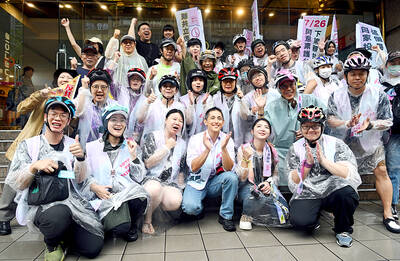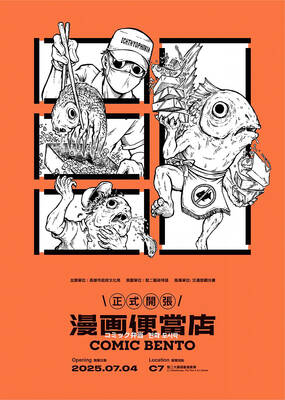Like many Taiwanese, Jiang Bai-le (江柏樂) blames the country's economic doldrums on President Chen Shui-bian (陳水扁).
Only his criticism has nothing to do with Chen's policies.
"Taiwan's economic situation since 2004 has been poor because Chen Shui-bian chose a building to house his father's cremated remains," says Jiang, who makes geomantic predictions on his popular television program Fun With Fortune-Telling (命運好好玩).

ILLUSTRATION: MOUNTAIN PEOPLE
But Jiang is optimistic that no matter who wins the March 22 presidential election, the country's economy will rally soon.
"I've checked the names of Taiwan's top entrepreneurs, and beginning in the sixth month of the lunar calendar all of their business prospects will improve," he says.
Such prognosticating might be treated with derision among skeptical quarters, but in Taiwan feng shui masters like Jiang earn good money helping businessmen and political candidates make decisions.
They're also active in the property market, consulting real estate investors and interior designers who believe feng shui - the ancient practice of organizing space to maximize the flow of positive energy - can influence everything from one's working environment to personal health.
Feng shui specialists say they can manipulate the flow of qi (氣), the invisible life force or energy that resides in every living thing. By limiting the flow of negative qi and accentuating the flow of positive qi, they claim the ability to ensure positive future outcomes for their clients. Call it risk management the old-fashioned way.
finding the right person for the job
Chao Tsai-ling (趙采羚), who runs a New Age shop near to Taipei 101 that sells crystals and other good luck charms, has hired seven feng shui specialists, including two since she moved to Taipei five years ago.
To find the right feng shui master, or geomancer, she relies on recommendations from friends. Word of mouth gets around and specialists whose clients suffer misfortune quickly gain a bad reputation.
"Experience has taught me that you don't just look at your own fortune, but the fortune of the feng shui specialist as well," she says.
She cites as an example the 921 earthquake, which happened after the second feng shui master changed the position of her bed.
"My husband then lost his job," she says. "The third feng shui master also suggested we change the position of the bed, but after sleeping in it for a little while my husband contracted cancer. A year after my husband's surgery, we moved out of that house."
Chao has now found a feng shui master she likes. Her husband's health has improved and her business is flourishing. She is so convinced feng shui works that she has decided to delve deeper into the "science."
"I am now studying feng shui," she says. "But I'm doing it for my friends and customers as much as I am doing it for myself."
Many businessmen hire feng shui masters when they build offices or factories. By minimizing the effects of negative qi, they hope to improve the fortunes of companies and ensure better health for their employees. Geomancy is such a pervasive element in Taiwan's property market that most real estate agents receive training in the practice.
Yu Shu-hui (游淑慧), who runs Jiin Der Interior Design (覲得空間設計), estimates that 80 percent of her clients believe in geomancy. Many demand that a feng shui master play a direct role in designing their apartments.
"[Interior designers] are the least important in the client's opinion - especially in comparison to the suggestions of a feng shui master," she says.
Feng shui-oriented interior design
Qi flows in through the front door of an apartment just as air flows into a human body through the mouth, Yu says, using the human body as a metaphor to explain how feng shui principles are applied to interior design and architecture.
To improve an apartment's feng shui, she recommends installing a round crystal light above the front door to deflect the flow of negative qi and improve the flow of positive qi. According to feng shui experts, crystals and round shapes attract positive qi and repel negative qi.
It's "a kind of environmental filter," Yu says.
Chen I-tien (陳議添), a real estate agent with Sinyi Real Estate Inc (信義房屋) says a diagnosis of bad feng shui can cause many a buyer to get cold feet.
"We hate it when a client shows up with a feng shui specialist because the geomantic analysis will bear a direct influence on the price," he said. "The difference in price can be as high as 10 to 20 percent."
Chen says elderly customers are more concerned about feng shui, and the wealthy employ specialists more often than middle-class clients. Some clients will even hire a geomancer just to bargain down the price.
Statistics on the feng shui industry are hard to come by because it is not regulated by the government. But a recent Internet search found contact information for more than 60 feng shui associations in Taiwan, most located in larger cities like Taipei, Taichung and Kaohsiung.
According to a 1994 survey conducted by Academia Sinica, 33.2 percent of 1,862 respondents said they had used the services of a feng shui master in the previous five years. In another poll, when asked what respondents felt about the effectiveness of feng shui, 20.1 percent said it was helpful or extremely helpful while 25.3 percent said it "only provided assurance."
This kind of assurance doesn't come cheap. Jiang, of Fun With Fortune-Telling, charges NT$20,000 to examine a house smaller than 30 ping (109m2) and NT$60,000 for a 100-ping apartment.
His geomantic predictions are also published in tabloids such as Apple Daily (蘋果日報), where he recently candidly discussed the fortune of Terry Gou (郭台銘), Chairman of Hon Hai Precision Industry Co (鴻海精密) and one of Taiwan's richest and most high-profile executives.
The feng shui of Gou's grandfather's grave "is excellent, but his father's grave feng shui is very bad," Jiang told the Taipei Times. "As a result, he will earn money throughout his life, but many in his family will fall victim to sickness and die."
He suggested that Gou change the site of his grandfather's grave to ensure the future health of his family. Many heads of large Taiwanese companies, such as Gou, bury their ancestors because cremation creates negative feng shui for future generations.
Jiang draws a distinction between ancestor feng shui and grave feng shui. The former affects the people who live in a particular house; the latter influences the entire family.
Then there's political feng shui.
When looking at the prospects of presidential candidates Ma Ying-jeou (馬英九) and Frank Hsieh (謝長廷), for example, "it is first important to see if it is their destiny to become president. Then you look at their luck for a particular year," Jiang says.
"It is also important to remember they are running for president and not county or village commissioner. When running for president, one has to take into consideration the party's entire operations, including the feng shui of the Democratic Progressive Party and the Chinese Nationalist Party's (KMT) party headquarters," he says.
In Jiang's view, the feng shui of Hsieh's campaign headquarters is poor, but the DPP's head office has good feng shui.
He recommends that Hsieh install a water fountain in front of his campaign headquarters to reduce harmful qi.
The feng shui of Ma's campaign headquarters, however, is very good, while the KMT headquarters' feng shui is especially bad - so bad, in fact, that the only way to fix it would be to move into a different building.
The bad feng shui of the KMT's headquarters will translate into infighting among party workers, Jiang says, "so Ma has to pay attention to the competition among the KMT's vice-chairmen and the disputes among party cadres."
professional qualifications
Though practitioners say geomancy is science - "it works like a magnetic field," according to Jiang - you can't get a degree in feng shui. Unlike lawyers or insurance brokers - professions who manage risk in a modern way - feng shui practitioners don't take classes or sit for exams to prove their abilities. Feng shui associations exist, but they are considered private businesses, not professional associations.
One only need call oneself a geomancer to become one. Salesmanship and an ability to belittle one's competitors - Jiang, for example, says he is the "world's best" geomancer - are a big part of the job.
But being a famous feng shui master is also hard work. Jiang calculates the feng shui of 100 structures a month and claims to have looked at the feng shui of more than 7,000 spaces since he opened his practice a decade ago. His television program Fun With Fortune-Telling runs from 9:30pm to 11pm on channel Super TV (STV) five nights of the week.
Still, the payoff can be high.
"I predicted the real estate market in Kaohsiung would rise," Jiang says. "And it rose." Many investors, he says, felt confident about buying property and made money as a result.

July 28 to Aug. 3 Former president Chiang Kai-shek (蔣介石) reportedly maintained a simple diet and preferred to drink warm water — but one indulgence he enjoyed was a banned drink: Coca-Cola. Although a Coca-Cola plant was built in Taiwan in 1957, It was only allowed to sell to the US military and other American agencies. However, Chiang’s aides recall procuring the soft drink at US military exchange stores, and there’s also records of the Presidential Office ordering in bulk from Hong Kong. By the 1960s, it wasn’t difficult for those with means or connections to obtain Coca-Cola from the

Fifty-five years ago, a .25-caliber Beretta fired in the revolving door of New York’s Plaza Hotel set Taiwan on an unexpected path to democracy. As Chinese military incursions intensify today, a new documentary, When the Spring Rain Falls (春雨424), revisits that 1970 assassination attempt on then-vice premier Chiang Ching-kuo (蔣經國). Director Sylvia Feng (馮賢賢) raises the question Taiwan faces under existential threat: “How do we safeguard our fragile democracy and precious freedom?” ASSASSINATION After its retreat to Taiwan in 1949, the Chinese Nationalist Party (KMT) regime under Chiang Kai-shek (蔣介石) imposed a ruthless military rule, crushing democratic aspirations and kidnapping dissidents from

Taiwan is today going to participate in a world-first experiment in democracy. Twenty-four Chinese Nationalist Party (KMT) lawmakers will face a recall vote, with the results determining if they keep their jobs. Some recalls look safe for the incumbents, other lawmakers appear heading for a fall and many could go either way. Predictions on the outcome vary widely, which is unsurprising — this is the first time worldwide a mass recall has ever been attempted at the national level. Even meteorologists are unclear what will happen. As this paper reported, the interactions between tropical storms Francisco and Com-May could lead to

It looks like a restaurant — but it’s food for the mind. Kaohsiung’s Pier-2 Art Center is currently hosting Comic Bento (漫畫便當店), an immersive and quirky exhibition that spotlights Taiwanese comic and animation artists. The entire show is designed like a playful bento shop, where books, plushies and installations are laid out like food offerings — with a much deeper cultural bite. Visitors first enter what looks like a self-service restaurant. Comics, toys and merchandise are displayed buffet-style in trays typically used for lunch servings. Posters on the walls present each comic as a nutritional label for the stories and an ingredient